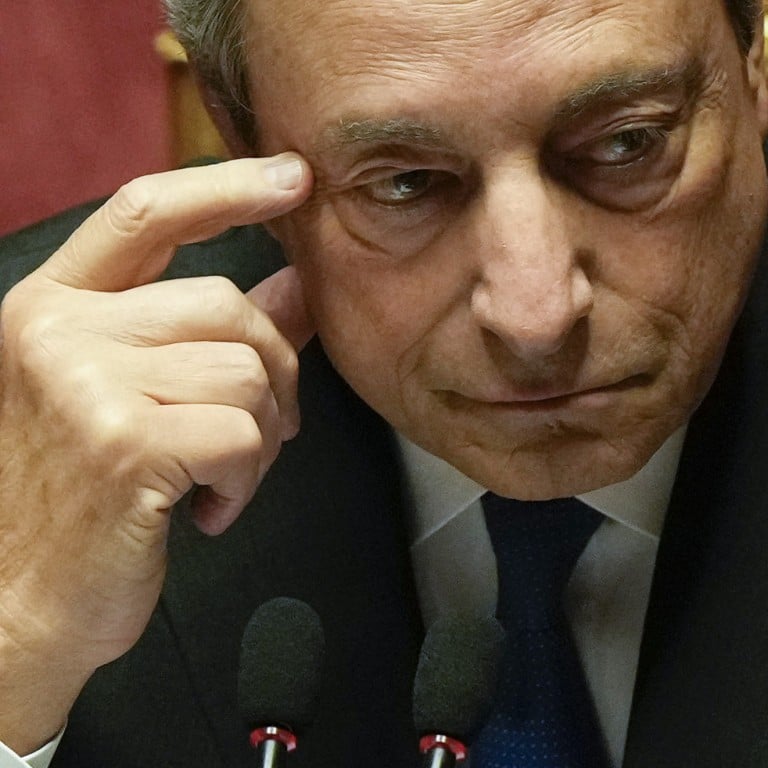
In or out? Asks Italy’s PM Mario Draghi – awaiting fate in hands of coalition
- He wanted to resign because he didn’t have the backing of parties in his coalition – they are discussing his reassurances that flagship measures will go ahead
- The parties are unhappy about his reference to fiscal reform, freeing up beach concessions and his pledge of military aid to Ukraine
Italy held its breath on Wednesday as the country’s fractious parties furiously debated whether to support popular Prime Minister Mario Draghi at a crucial confidence vote to end a political crisis that could send Italians to snap elections.
Now was not the time for uncertainty within the euro zone’s third largest economy, amid a myriad of domestic and geopolitical challenges, from a struggling economy to Ukraine war, Draghi earlier told the Senate.
“We now need staunch support for the government’s programme,” he said, calling on parliamentarians for “courage, selflessness, credibility”.
“Are you ready? … You don’t owe this answer to me, but to all Italians”, he added.
In the stern speech by a usually softly-spoken Draghi, the former leader of the European Central Bank, who offered his resignation last week, said he was prepared to stay – but on one condition: if the wildly disparate parties pledge anew to a common agenda.
The crisis was sparked by the refusal by the Five Star Movement, a coalition member, to opt out of a confidence vote last week.
Draghi moved immediately to step down, but was persuaded by Italy’s president to reach out to parties first.
Italian PM Draghi offers to quit, but president rejects his resignation
Polls suggest most Italians want Draghi, 74, to stay at the helm until the scheduled general election in May next year. His departure could force the president to dissolve parliament and call elections for September or October.
“Draghi did not compromise. He was very tough,” Francesco Galietti, Policy Sonar analyst, said.
“The entire speech was stick and carrot – though much more stick than carrot”.
There is much at stake: a government collapse could worsen social ills in a period of rampant inflation, delay the budget, threaten EU post-pandemic recovery funds and send jittery markets into a tailspin.
Draghi noted Wednesday that as an unelected leader he needs the broadest consensus possible to tackle Italy’s most pressing issues: from a cost of living crisis and recession worries, to the roll-out of key reforms and Ukraine war.
For a long time, he said, his coalition was able “to put aside divisions and come together … for rapid and effective action, for the good of all citizens”.
But that had dropped by the wayside as the parties began focusing more on their grass roots supporters ahead of next year’s ballot.

Parties on the centre-left immediately said they would support Draghi at the vote later Wednesday.
The two right-wing parties in the coalition, ex-premier Silvio Berlusconi’s Forza Italia and Matteo Salvini’s anti-immigration League, said they would only remain in Draghi’s government if it did not include the Five Star.
Draghi “scolded his coalition partners for infighting and point-scoring” over the past few months and laid out a government line that “contains measures that either the League or the Five Star Movement firmly oppose,” Teneo consultancy’s Wolfango Piccoli said in a note.
“By not making any new concessions to either party, Draghi did not make it easy for the League and the Five Star”.
As the parties fiercely debated in the Senate, it was not clear which way the Five Star would vote.
The populist party may split at the vote, with Forza Italia and the League potentially agreeing to work with the breakaway element.
Once the largest party in parliament, the Five Star Movement has already seen scores of defections as it hews to its radical, anti-establishment side in a bid to reverse plummeting support in the polls.

